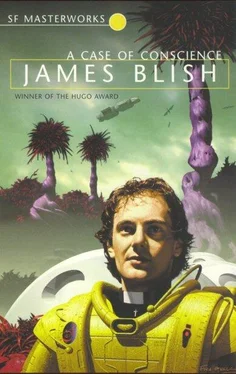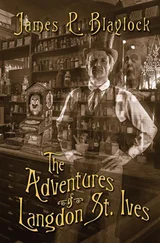“We will start a soil-sampling program at once,” Chtexa said, his wattles flaring a subdued orchid. “Our antibiotics research centers screen soil samples by the thousands each month, in search of new microflora of therapeutic importance. If these iron-fixing bacteria exist, we are certain to find them eventually.”
“They must exist. Do you have a bacterium that is a sulphur-concentrating obligate anaerobe?”
“Yes-yes, certainly!”
“There you are,” the Jesuit said, leaning back contentedly and clasping his hands across one knee. “You have plenty of sulphur, and so you have the bacterium. Please let me know when you find the iron-fixing species. I’d like to make a subculture and take it home with me when I leave. There are two Earth scientists whose noses I’d like to rub in it.”
The Lithian stiffened and thrust his head forward a little, as if puzzled.
“Pardon me,” Ruiz-Sanchez said hastily. “I was translating literally an aggressive idiom of my own tongue. It was not meant to describe an actual plan of action.”
“I think I understand,” Chtexa said. Ruiz-Sanchez wondered if he did. In the rich storehouse of the Lithian language he had yet to discover any metaphors, either living or dead. Neither did the Lithians have any poetry or other creative arts. “You are of course welcome to any of the results of this program, which you would honor us by accepting. One problem in the social sciences which has long puzzled us is just how one may adequately honor the innovator. When we consider how new ideas change our lives, we despair of giving in kind, and it is helpful when the innovator himself has wishes which society can gratify.”
Ruiz-Sanchez was at first not quite sure that he had understood the formulation. After he had gone over it once more in his mind, he was not sure that he could bring himself to like it, although it was admirable enough. From an Earthman it would have sounded intolerably pompous, but it was evident that Chtexa meant it.
It was probably just as well that the commission’s report on Lithia was about to fall due. Ruiz-Sanchez had begun to think that he could absorb only a little more of this kind of calm sanity. And all of it-a disquieting thought from somewhere near his heart reminded him-all of it derived from reason, none from precept, none from faith. The Lithians did not know God. They did things rightly, and thought righteously, because it was reasonable and efficient and natural to do and to think that way. They seemed to need nothing else.
Did they never have night thoughts? Was it possible that there could exist in the universe a reasoning being of a high order, which was never for an instant paralyzed by the sudden question, the terror of seeing through to the meaninglessness of action, the blindness of knowledge, the barrenness of having been born at all? “Only upon this firm foundation of unyielding despair,” a famous atheist once had written, “may the soul’s habitation henceforth be safely built.”
Or could it be that the Lithians thought and acted as they did because, not being born of man, and never in effect having left the Garden in which they lived, they did not share the terrible burden of original sin? The fact that Lithia had never once had a glacial epoch, that its climate had been left unchanged for seven hundred million years, was a geological fact that an alert theologian could scarcely afford to ignore. Could it be that, free from the burden, they were also free from the curse of Adam? And if they were-could men bear to live among them?
“I have some questions to ask you, Chtexa,” the priest said after a moment. “You owe me no debt whatsoever-it is our custom to regard all knowledge as community property-but we four Earthmen have a hard decision to make shortly. You know what it is. And I don’t believe that we know enough yet about your planet to make that decision properly.”
“Then of course you must ask questions,” Chtexa said immediately. “I will answer, wherever I can.”
“Well then-do your people die? I see you have the word, but perhaps it isn’t the same in meaning as our word.”
“It means to stop changing and to go back to existing,” Chtexa said. “A machine exists, but only a living thing, like a tree, progresses along a line of changing equilibriums. When that progress stops, the entity is dead.”
“And that happens to you?”
“It always happens. Even the great trees, like the Message Tree, die sooner or later. Is that not true on Earth?”
“Yes,” Ruiz-Sanchez said, “yes, it is. For reasons which it would take me a long time to explain, it occurred to me that you might have escaped this evil.”
“It is not evil as we look at it,” Chtexa said. “Lithia lives because of death. The death of plants supplies our oil and gas. The death of some creatures is always necessary to feed the lives of others. Bacteria must die, and viruses be prevented from living, if illness is to be cured. We ourselves must die simply to make room for others, at least, until we can slow the rate at which our people arrive in the world-a thing impossible to us at present.”
“But desirable, in your eyes?”
“Surely desirable,” Chtexa said. “Our world is rich, but not inexhaustible. And other planets, you have taught us, have peoples of their own. Thus we cannot hope to spread to other planets when we have overpopulated this one.”
“No real thing is ever exhaustible,” Ruiz-Sanchez said abruptly, frowning at the iridescent floor. “That we have found to be true over many thousands of years of our history.”
“But exhaustible in what way?” Chtexa said. “I grant you that any small object, any stone, any drop of water, any bit of soil can be explored without end. The amount of information, which can be gotten from it is quite literally infinite. But a given soil can be exhausted of nitrates. It is difficult, but with bad cultivation it can be done. Or take iron, about which we have been talking. To allow our economy to develop a demand for iron which exceeds the total known supply of Lithia-and exceeds it beyond any possibility of supplementation by meteorites or by import-would be folly. This is not a question of information. It is a question of whether or not the information can be used. If it cannot, then limitless information is of no help.”
“You could certainly get along without more iron if you had to,” Ruiz-Sanchez admitted. “Your wooden machinery is precise enough to satisfy any engineer. Most of them, I think, don’t remember that we used to have something similar: I’ve a sample in my own home. It’s a kind of timer called a cuckoo clock, nearly two of our centuries old, made entirely of wood except for the weights, and still nearly a hundred per cent accurate. For that matter, long after we began to build seagoing vessels of metal, we continued to use lignum vitae for ships’ bearings.”
“Wood is an excellent material for most uses,” Chtexa agreed. “Its only deficiency, compared to ceramic materials or perhaps metal, is that it is variable. One must know it quite well to be able to assess its qualities from one tree to the next And of course complicated parts can always be grown inside suitable ceramic molds; the growth pressure inside the mold rises so high that the resulting part is very dense. Larger parts can be ground direct from the plank with soft sandstone and polished with slate. It is a gratifying material to work, we find.”
Ruiz-Sanchez felt, for some reason, a little ashamed. It was a magnified version of the same shame he had always felt back home toward that old Black Forest cuckoo clock. The electric clocks elsewhere in his hacienda outside Lima all should have been capable of performing silently, accurately, and in less space-but the considerations which had gone into the making of them had been commercial as well as purely technical. As a result, most of them operated with a thin, asthmatic whir, or groaned softly but dismally at irregular hours. All of them were “streamlined,” oversized and ugly. None of them kept good time, and several of them, since they were powered by constant-speed motors driving very simple gearboxes, could not be adjusted, but had been sent out from the factory with built-in, ineluctable inaccuracies.
Читать дальше











